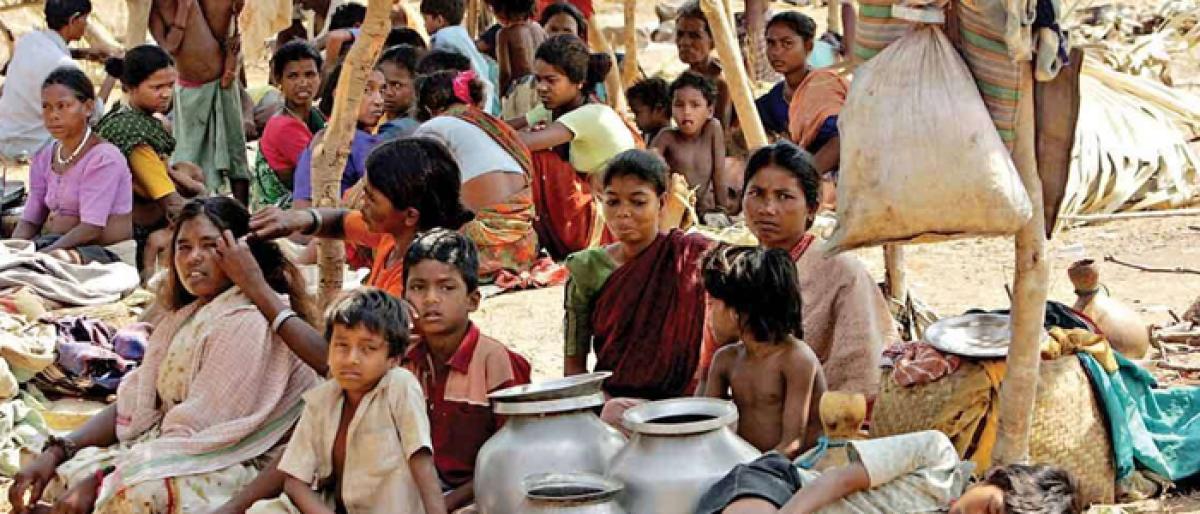Inclusive development: Relevance of socio-political factors

Globalisation and internal liberalisation of the economy within an inequitable social structure result in accentuating the existing inequalities in income and wealth in the society, unless serious efforts are made simultaneously to remove social barriers to equal opportunity and equip the youth with necessary education and skills Such safeguards are lacking under dictatorships or the totalitarian
Globalisation and internal liberalisation of the economy within an inequitable social structure result in accentuating the existing inequalities in income and wealth in the society, unless serious efforts are made simultaneously to remove social barriers to equal opportunity and equip the youth with necessary education and skills. Such safeguards are lacking under dictatorships or the totalitarian political systems. This may explain why income inequalities have increased faster in China than in India in the post-liberalisation period, despite the initial conditions like the levels of economic and social infrastructure being favourable in China in the pre-liberalisation period.
Rising inequalities in wealth and income lead to unequal access to power, status and influence. Democracies may be less prone to such state capture than dictatorships but even democracies have proved to be vulnerable to pressures from the powerful private interests, particularly when the prevailing social structure is inequitable, as in India.
Policy analyses, world-wide, highlight rising income inequalities as the foremost concern today. Recent OECD evidence based on a sample of 15 countries over the period 2002-12 showed a negative correlation between income inequality within a region and region’s growth, basically on account of underinvestment in human capital by the lower income groups, suggesting that policies should avoid the “grow first, distribute later” assumption that has characterised the economic paradigm until recently, and instead consider from the outset the way in which the benefits of growth will be distributed to different income groups
Further, there is a general consensus among these studies on the major factors driving inequalities and on the agenda for action to reduce inequalities, prominent among such agenda being public provision of education, health care and necessary skills. But these studies do not ask why countries in general failed to implement such agenda effectively, even though these measures have been articulated for over two decades – a period during which inequalities have in fact reached unacceptable proportions. There is thus a major gap in understanding with respect to the relevance of socio-political factors beyond the oft- repeated economic policy agenda.
In general, democracy has been regarded as a major political instrument for achieving inclusive development. But inequalities have been rising even in mature democracies which had experienced democratic revolutions long ago and have undergone radical social transformation, as in Europe. In China, feudalism was abolished in the late 1940s. However, its authoritarian political system with enormous powers for political mobilisation and will for action while successful in bringing about high growth resulted in highly uneven sharing of gains from growth.
India, on the other hand, succeeded in sustaining democracy so far in a society that is ancient, slow-moving and ridden with various kinds of inequities with respect to classes, castes, gender, etc. But instead of democracy bringing about radical social change, the long-entrenched and powerful social groups are able to influence even the popularly elected governments for appropriating disproportionately large benefits from growth.
There seem to be two sources for the failure of democracies in this respect. In the first place, democracies were expected to give rise to large middle class that would espouse the cause of liberty and equality, but experience has shown that the upper sections of the middle class are more interested in reaching the top 10 per cent or 1 per cent of the income ladder than joining the forces working for wider sharing of benefits from growth. Another major source for distortion of democratic framework is ‘money power’. It ranges from the very wealthy employing the highly paid consultants and lawyers for ‘tax planning’ to financing interest lobbies to win over the law-makers, as often observed in the United States and even in other democracies in Europe.
It is now widely recognised in social science research that much of the variation in poverty and inequality across rich democracies is due to politics and institutions. For example, there is convincing evidence of a strong relationship between unionisation and higher earnings, and lower inequality and poverty, the indirect effect of unionisation through liberal welfare policies of states becoming more prominent. The proportional representation system of democracy, where multiparty competition becomes effective at different stages, explains why countries in Europe with the system of proportional representation have much less poverty and inequality than the countries with majoritarian system like the United States.
There is evidence that congressional shifts to the Republican Party, diminishing Union membership, lower tax rates, and financial asset bubbles played a strong role in the rise of super-rich in the United States. Those in power favouring free markets do not simply ‘let markets do their job’ and actively influence how markets work through their institutional choices of whom to tax and what to regulate. One of the emerging concerns with the dramatically rising inequality in countries like U.S. is that this results in an unbalanced distribution of political power which reinforces inequalities and may by itself have a corrosive effect on democracy.
A major casualty of rising income inequality and the increasing role of money power in policy-making is that those adversely affected start losing interest in the prevailing democratic system. This is confirmed by a study which, based on individual survey data from twenty-four democratic countries, demonstrates that increasing income inequality strongly depresses political engagement by people who feel left out. The decline in voter participation and apathy is explained by the decline in the government expenditure on social development and welfare measures as a proportion of G.D.P. since late-eighties, which had steadily increased earlier in such economies for over two decades on account of unionization and political pressures.
All this shows that formulating a good policy agenda for achieving inclusive growth is not enough. There is need for a debate on the efficacy of the existing framework of democracy and necessary modifications so as to enable it to more adequately represent the long-term societal aspirations for justice and fair-play. It is also necessary to explore the possibilities of strengthening civil society activism by combating the prevailing apathy. This is a formidable challenge at the political level. But intellectuals can contribute to this effort through their investigations and thinking. This requires individual as well as joint effort from different scholars such as political scientists, sociologists, historians, economists and others.
(C H Hanumantha Rao - The author is Honorary Professor, Centre for Economic and Social Studies, Hyderabad. This piece is part of the inaugural address at the international seminar on “Inclusive Development: Issues and Challenges” held at the CESS in honour of Prof. R. Radhakrishna, on October 8-9.)














